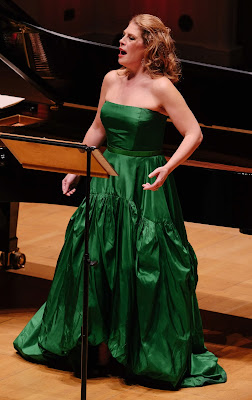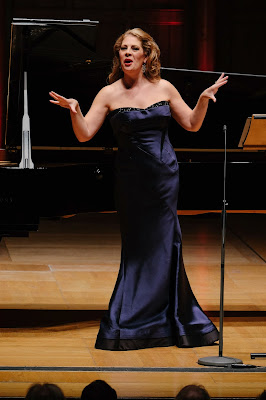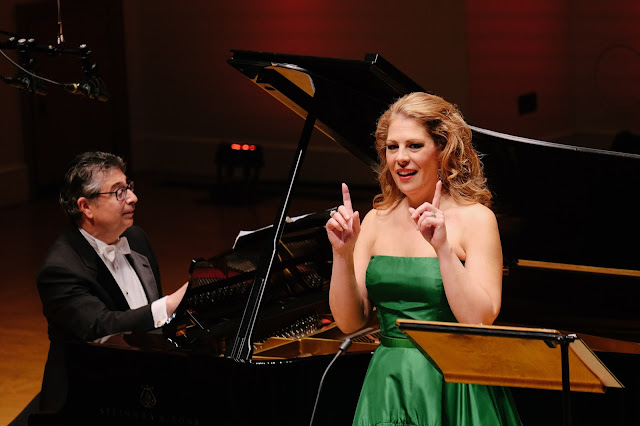 |
| Anthony Manoli & Sondra Radvanovsky at Rosenblatt Recitals at Cadogan Hall (photo Jonathan Rose) |
Reviewed by Robert Hugill on Mar 16 2017
Star rating:
An interesting and varied programme which only came fully alive in the final items
 |
| Sondra Radvanovsky (photo Jonathan Rose) |
There was something slightly old school about Sondra Radvanovsky's recital in the way she started with arie antiche. The programme was an interesting one which eschewed opera arias entirely until the last item, but it was only in the Giordano and the encores (three opera arias and a song from a musical) that Radvanovsky's voice seemed to come fully alive and fill the Cadogan Hall with vibrant life. Though their voices are very different, in many ways Radvanovsky's recital reminded me of the ones I heard Montserrat Caballe give at Covent Garden, with the careful trajectory from opening arie antiche to final encores when hair is finally let down.
Alessandro Parisotti's arrangement of Geminiano Giacomelli's 'Sposa son disprezzata' was written in 1890, in an age long before period performance practice. The aria is from Giacomelli's opera La merope, but is best known for being included in Vivaldi's pasticcio La Bajazet. Radvanovsky sang it using a beautifully modulated middle voice only rising to full voice at climaxes, her expressive phrasing taking classic 19th century view of the music.
Sony Radvanovsky has quite a large voice, her signature roles include the title role in Bellini's Norma and Leonora in Verdi's Il trovatora, roles which require a certain combination of volume and flexibility. Radvanovsky has this in spades, she regularly fined her voice right down and showed an impressive degree of control. This is combined with a rather particular, vibrant quality which means one's impression of the voice is of the highly distinctive and expressive phrasing rather than a pure sense of line.
In Bellini's three ariette, from the group published in 1829, 'Per pieta, bell'ido mio', 'la ricordanza' and 'Ma rendi pur contento' Radvanovsky used her richly vibrant voice to highly expressive effect, creating deeply felt performances, but which at times she seemed to put too much expressive weight on the simple songs. There were, however, some lovely moments, finely turned phrases and some lovely floated top notes.
 |
| Sondra Radvanovsky (photo Jonathan Rose) |
Radvanovsky's does not have a classic Richard Strauss voice, but Allerseelen fitted her voice well and was sung with highly creditable German supported by Anthony Manoli's strong piano. She put quite a range of colour into the voice, bringing out the emotions in the song. Befreit was beautifully controlled, rising to an intense, vibrant climax. Whilst Morgen was similarly finely controlled, I felt that the song did not quite float in the way it should and seemed anchored in Radvanovsky's middle voice. Heimliche Aufforderung was very vibrant, with a slow build leading to a terrific climax, again with a great sense of drama in the voice. Rather than lyric elegance of line, these were performances characterised by a luxuriant richness of timbre, a highly expressive flexibility of phrasing and a real sense of drama.
For the second half Radvanovsky and Manoli opened with a group of Franz Liszt's songs settings French texts by Victor Hugo dating from 1859. S'il est un charmant gazon is a charming song, but the sheer vibrancy of Radvanovsky's voice, despite her thinning it down, made one long for a simpler approach to the piece. Enfant, si j'etais roi was vibrantly dramatic with Radvanovsky really selling the piece. Oh! quand je dor was very affecting, with a beautifully floated ending. Though the performances were, perhaps, some way from my ideal interpretation of these song, the three songs really gave us the opportunity to appreciate Radvanovsky's fine artistry,
Samuel Barber's Hermit Songs were written in 1953 for Leontine Price (cue a charming story about meeting Price backstage at the Met when Radvanovsky was still a young artist). The texts were originally written in medieval Gaelic or Latin and translated into English by a variety of people. The texts are anonymous, created by monks and scholars, often in the margins of manuscripts, short and straightforward observations and poems. A Saint Patrick's Purgatory was vibrant, with a strong piano accompaniment from Anthony Manoli, but Radvanovsky's performance seemed a little score bound and did not quite bring this strange little song alive. In Saint Ita's Vision she showed great sense of narrative, and gave a lovely floated ending to it. The Crucifiction was remarkably austere, not showy at all. The final two songs, The Mon and his Cat and The Desire for Hermitage were both performed with great charm bu could have done with a greater sense of the words.
For the final item, 'La mamma morta' from Giordano's Andrea Chenier, Radvanovsky's voice seemed to finally move up gear. The role is new for her, she performs it at the Liceu in Barcelona next season. Her account of the aria was full of passion, with the voice rising to a thrilling climax though remaining wonderfully focused.
 |
| Anthony Manoli & Sondra Radvanovsky at Rosenblatt Recitals at Cadogan Hall (photo Jonathan Rose) |
Elsewhere on this blog:
- We're crowdfunding for Quickening, a disc of new settings of Rowan Williams, AE Housman, Ivor Gurney, Christina Rossetti by Robert Hugill coming out on the Navona Records label, please visit http://www.crowdfunder.co.uk/quickening
- Nancy Cunard invites: Handel's Partenope at ENO - opera review
- Festa Veneziana: Schola Cantorum of the Cardinal Vaughan Memorial School - concert review
- Youth Brahms: Serenades from Gävle on Ondine - Cd review
- Birthday double bill: Noah Mosley's Mad King Suibhne and L'Ospedale at Bury Court Opera - Opera review
- Live in HD: La traviata from the Met - Opera review
- Intoxicating mix: ZRI's Schubert at the Red Hedghog - CD review
- Pointed delight: Gilbert & Sullivan's Patience from ETO
- Its heart in the right place: ETO's Tosca - Opera review
- Sacred and Profane: Netherlands Chamber Choir and Peter Dijkstra - Concert review
- Shedding light on a forgotten Romantic: Mehul's Uthal - CD review
- Home



.jpg)
%20Ali%20Wright-28.jpg)
.jpg)





No comments:
Post a Comment